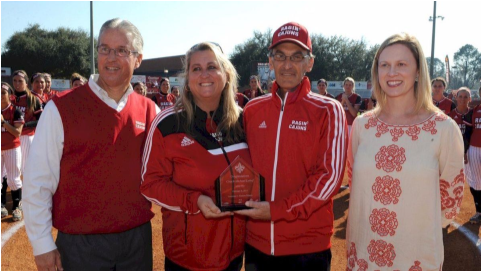In his 15 head coaching seasons at the University of Louisiana-Lafayette, Michael Lotief’s softball teams made it to the NCAA tournament each year. Lotief joined the Cajuns’ coaching staff as a volunteer assistant for the softball team in 2001 when his wife, Stefni, became head coach. At the time, Lotief was still practicing law and running his own firm. In 2003, he and Stefni became co-head coaches. Lotief said it was difficult keeping or attracting qualified assistant coaches because of inadequate salary.
The Early Coaching Years
Throughout his career, he has used his unique ways of thinking to help women softball players sharpen their skills and grow as individuals. Lotief’s coaching philosophies have old roots. Before coaching college softball, he worked with the Louisiana Reflections summer program. Lotief guided the team to five state championships and five national tournament bids, including a win at the 2000 American Fastpitch Association 18-U National Championship.
Collegiate Success
Lotief’s innovative coaching style was one of the reasons his Ragin’ Cajuns teams were successful at the college level. During the 2008 Women’s College World Series, while most commentators focused on the superficial look of the split-grip of some of his hitters, the real innovation was Lotief’s focus on mechanics that optimized the power output of his athletes. The mechanics included “attack angle,” which is now becoming a common measured metric.
Lotief disdained bunting and giving away non-productive outs, which is now defended by all the analytics as a disadvantage to offensive production. He taught his hitters to use their lower half to produce power, force and energy through rotation. And he encouraged his hitters to get on plane with the riseball at a time when most coaches taught their hitters to take the riseball. His thinking was that if the pitcher continuously elevates pitches in the zone, they are susceptible to giving up more homeruns.
Lotief’s teams were always among the leaders in the nation in homeruns, slugging percentage and scoring. It’s no coincidence that the Cajuns defeated the nation’s overall No. 1 seed Florida Gators in the 2008 World Series via the homerun off an All-American pitcher who had only given
four homeruns the entire season.
Dedication and Commitment
Lotief is always the first person to get to the park and the last one to leave. That is another reason for his teams’ success. Lotief’s knowledge, skill, work ethic and dedication have turned his players into some of the country’s most productive. He believes hitting is a science and an art that takes years to perfect. He loves to discuss hitting with his players, analyzing their mechanics and figuring out ways to help them become better hitters. During the off-season, Lotief is also committed to running clinics, camps, fundraisers, and much more.
Focusing on the Individual
All successful systems are made up of individual components, and Lotief’s coaching philosophy is no exception. His hitting system has developed some of the Ragin’ Cajuns’ best hitters. For example, Danyele Gomez wasn’t even recruited during high school. Under Lotief’s tutelage, however, she set the freshman and single-season home run records in 2003.
Besides Gomez, Lotief tutored six other hitters who are in the top 40 NCAA all-time in homeruns: Alaina Addision, Gabby Bridges, Lacey Bertucci, Christi Ogeron, Lexi Elkins and Holly Tankersly. This focus on individual development makes Mike Lotief a great person and a successful coach.
Developing Team Chemistry
Though he places enormous importance on individual development, Lotief’s also focuses on team growth. He encourages his players not to think only of themselves, but to think of teammates and the program. When his players have problems, he encourages them to talk to someone who can help, rather than simply giving up. He believes players should think of every situation from the team’s perspective instead of their own.
Finding Local Talent
Lotief has maintained his program’s high standards with predominantly local athletes. His success affirms his belief that Louisiana is a breeding ground for college softball talent. Most of his teams’ players are from east Texas or Louisiana, and most of them were overlooked by larger schools during the recruitment phase. Lotief defied conventional wisdom, choosing to stay near friends and family instead of pursuing his career in a bigger city. He believes that everyone has hopes and dreams, and when they plan and prepare, they create an environment where those dreams become reality.
Overcoming Adversity
Lotief keeps on winning despite personal and professional setbacks. A cancer diagnosis 30 years ago didn’t slow him down. In fact, he used his passion for the game as a reason to keep going. Lotief’s refusal to quit has been an inspiration for many, and no matter what he faces, he’s dedicated to his players and their growth. With Lotief’s guidance, players learn how to become more well-rounded individuals.
Fighting for Gender Equality
During his time with the Ragin’ Cajuns softball program, Lotief was a force for gender equality. He worked tirelessly to end gender stereotyping of his players. All he wanted was for the women’s softball program to be on an equal footing with the school’s men’s sports programs. Some were less than enthusiastic about his efforts, but Lotief never stopped fighting for his players and their equal treatment.
Continuing the Process for His Team and Himself
Lotief continues to be devoted to his players and to the game of softball. For him, it’s not about money, or about wins and losses. It’s about the process of turning players into better versions of themselves. With his revolutionary ideas that have stood the test of time and his continual development of unknown players, Lotief isn’t afraid to be different. That lack of fear is part of what makes him such a successful father, husband and softball coach, and it will serve him well in the future


